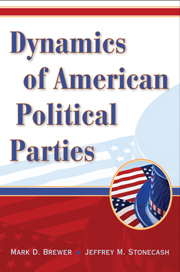Book contents
- Frontmatter
- Contents
- Figures and Tables
- Preface
- 1 DEMOCRACY, REPRESENTATION, AND PARTIES
- 2 OVERVIEW: SOCIAL CHANGE AND SHIFTING PARTY BASES
- 3 TAKING SHAPE: PARTY COALITIONS IN THE POST-BELLUM NINETEENTH CENTURY
- 4 REPUBLICAN ASCENDANCY AND DEMOCRATIC EFFORTS TO RESPOND, 1896–1928
- 5 TABLES TURN: THE NEW DEAL ERA AND DEMOCRATIC DOMINANCE, 1932–1948
- 6 THE DEMOCRATIC DRIVE TO THE GREAT SOCIETY
- 7 REPUBLICANS: REASSERTING CONSERVATIVE PRINCIPLES AND SEEKING A MAJORITY
- 8 THE STRUGGLE OF DEMOCRATS TO INTERPRET CHANGE AND RESPOND
- 9 GEORGE BUSH AND FURTHER POLARIZATION
- 10 THE 2008 ELECTION AND ITS INTERPRETATION
- 11 PARTIES AND THE PURSUIT OF MAJORITIES
- Bibliography
- Index
- References
3 - TAKING SHAPE: PARTY COALITIONS IN THE POST-BELLUM NINETEENTH CENTURY
Published online by Cambridge University Press: 05 June 2012
- Frontmatter
- Contents
- Figures and Tables
- Preface
- 1 DEMOCRACY, REPRESENTATION, AND PARTIES
- 2 OVERVIEW: SOCIAL CHANGE AND SHIFTING PARTY BASES
- 3 TAKING SHAPE: PARTY COALITIONS IN THE POST-BELLUM NINETEENTH CENTURY
- 4 REPUBLICAN ASCENDANCY AND DEMOCRATIC EFFORTS TO RESPOND, 1896–1928
- 5 TABLES TURN: THE NEW DEAL ERA AND DEMOCRATIC DOMINANCE, 1932–1948
- 6 THE DEMOCRATIC DRIVE TO THE GREAT SOCIETY
- 7 REPUBLICANS: REASSERTING CONSERVATIVE PRINCIPLES AND SEEKING A MAJORITY
- 8 THE STRUGGLE OF DEMOCRATS TO INTERPRET CHANGE AND RESPOND
- 9 GEORGE BUSH AND FURTHER POLARIZATION
- 10 THE 2008 ELECTION AND ITS INTERPRETATION
- 11 PARTIES AND THE PURSUIT OF MAJORITIES
- Bibliography
- Index
- References
Summary
We begin examining the evolution of American political parties in the post-bellum nineteenth century, starting with the 1876 election cycle. By 1876, Reconstruction (the efforts of the North to regulate the South and create a society where blacks had some rights) was ending as Northerners tired of the conflict the issue was creating. Furthermore, a deal had been struck in Congress: In exchange for accepting Republican Rutherford Hayes as the winner of the disputed 1876 presidential election, southerners were promised an end to Reconstruction. The result was that the national playing field had largely returned to normal by 1876. All of the former Confederate states had been readmitted to the Union, and almost all former Confederate soldiers and officials had regained full political privileges. We will end this chapter with a discussion of the 1892 election cycle, the final year in what can be described as a twenty-year dead heat in American electoral politics, at least as aggregated to the national level. The 1892 elections were also the final round of federal contests before the party alignment underwent a relatively dramatic change in favor of the Republican Party, which is the subject of the next chapter. This chapter focuses on the period from 1876 to 1892 and how the parties tried to construct winning coalitions for themselves during these years.
- Type
- Chapter
- Information
- Dynamics of American Political Parties , pp. 33 - 47Publisher: Cambridge University PressPrint publication year: 2009



